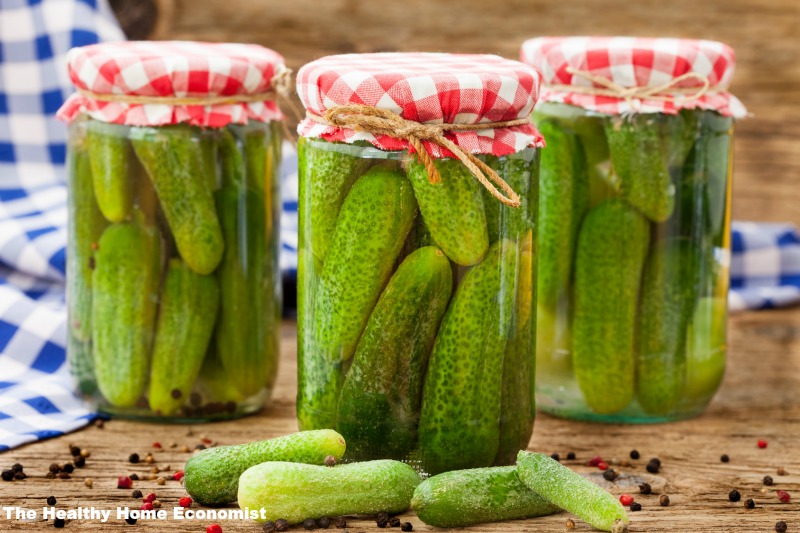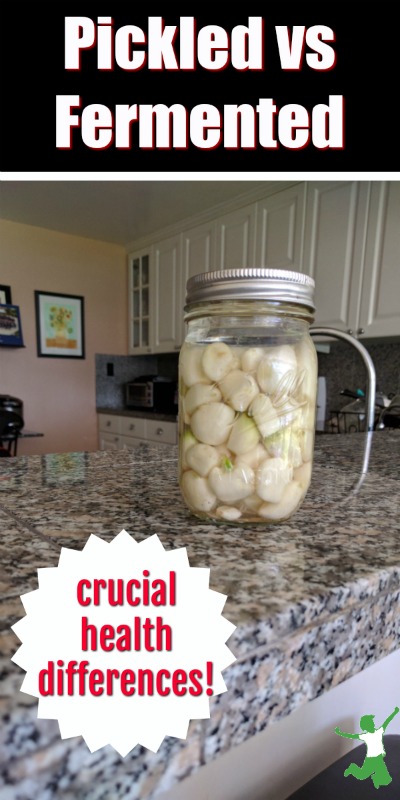The often overlooked differences between pickled and fermented foods. They are not necessarily the same nor do they offer the same benefits to health.
There seems to be a bit of confusion going around about fermented foods and the difference between what you make in your kitchen and the pickled versions that are available on the supermarket shelf. For example, in one of my video lessons, I demonstrate how to make sauerkraut in the traditional manner.
After the shredded cabbage ferments on the kitchen counter for a few days, it is then refrigerated or kept in a cool cellar where the sauerkraut remains naturally preserved for extended periods of time.
How does this homemade pickled cabbage compare to the pickled cabbage in a jar in the supermarket? What about pickled cucumbers or pickled garlic, also popular commercial choices?
Pickled vs Fermented Foods
Alex Lewin, author of Real Food Fermentation explains that the confusion comes from the overlap in definition. In a nutshell, not all fermented foods are pickled and not all pickles are fermented.
In other words, foods that are pickled are those that have been preserved in an acidic medium. In the case of various types of supermarket pickles on the shelf, the pickling comes from vinegar.
These vegetables, however, are not fermented (even though vinegar itself is the product of fermentation) and hence do not offer the probiotic and enzymatic value of homemade fermented vegetables.
Vegetables that you ferment in your kitchen using a starter, salt, and some filtered water create their own self-preserving, acidic liquid that is a by-product of the fermentation process. This lactic acid is incredibly beneficial to digestion when consumed along with the fermented vegetables or even when sipped alone as anyone on the GAPS Intro Diet has discovered (cabbage juice anyone?). In other words, homemade fermented veggies are both fermented and pickled.
Alcoholic Fermentation
What about alcoholic fermentation?
In the case of wine and unpasteurized beers, fermentation occurs as the result of certain yeasts converting sugars into alcohol but there is no pickling that takes place despite the common expression that a person who has had too much to drink is “pickled”.
4 Benefits of Culturing without Heat or Pressure
Home fermentation of vegetables preserves without the use of any pressure or heat unlike supermarket versions of the same foods. It allows the ubiquitous and beneficial lactobacilli present on the surface of all living things – yes, even your own skin – to proliferate creating lactic acid which not only pickles and preserves the vegetables, but also promotes the health of those that consume it in the following ways:
- Enhances the vitamin content of the food.
- Preserves and sometimes enhances the enzyme content of the food.
- Improves nutrient bio-availability in the body.
- Improves the digestibility of the food and even cooked foods that are consumed along with it!
Avoid Shelf Stable Pickled Foods
So don’t be fooled by unhealthy supermarket pickled versions of homemade fermented foods.
These modern foods are the product of high heat and pressure which destroys nutrients and does not in any way enhance health.
The one exception to this rule is the various fermented foods in the refrigerator section of many health food stores. These products are actually fermented and pickled. The only drawback is that these gourmet items are rather expensive compared to the pennies per ounce it costs to make them yourself.
If home fermentation is a kitchen goal that you are ready to tackle, there are plenty of fermented foods recipes on this blog to help get you started on this fun journey! If you prefer trying fermented beverages first, the provided link will take you to over two dozen recipes to consider.









You are doing a great job! Question: My jar of Bleu cheese stuffed olives says it contains lactic acid, but no vinegar listed on the label, is it fermented?
Great post! I’ve read a lot of posts about the difference between the two, but you went into more detail and much more clearly than other articles I’ve read. Fermentation is such an interesting process- every time I read about it, I learn something new!
In the GAPS “Heal Your Gut Cookbook” the authors use pickle juice as a starter for many fermentation recipes. I’m wondering if the pickle juice needs to be of the fermented variety or can it just be of the pickled variety? Will the fermentation process start/work either way? I know I’m late to this article and thread, but would really really appreciate a response.
If you use pickle juice to start a fermentation, it must be from actual fermented pickles. Pickle juice from pickles pickled in vinegar from the store won’t work as this juice is void of probiotics and will just result in mold.
All fermented foods are pickled.Taiwanese researchers decided to examine peanuts’ anti-colon cancer potential and conducted a 10-year study involving 12,026 men and 11,917 women to see if eating peanuts might affect risk of colon cancer. They tracked study participants’ weekly food intake, collecting data on frequently consumed foods and folk dishes such as sweet potato, bean products, peanut products, pickled foods, and foods that contained nitrates or were smoked.
Risk of colon cancer was found to be highly correlated with both peanuts, which greatly lessened risk, and PICKLED FOODS, which greatly increased risk, particularly in women..(Yeh CC, You SL, et al., World J Gastroenterol) source: whfoods.com/genpage.php
Yes, but not all pickled foods are fermented which is the point of the article.
Hi Sarah,
Is home made lime pickle fermented and good for the gut?
Thanks, Dan.
Hi Sarah,
Correct me if I’m wrong, but I believe you are incorrect when you say “not all fermented foods are pickled and not all pickles are fermented”. Technically all fermented foods ARE pickled. It should be the other way around; “Not all pickle foods are fermented.”
Right??
Well, here are two of many examples of fermented foods that are not pickled: fermented potatoes (recipe on this blog if you are interested and kombucha. There are many others 🙂
is it true the only way to tell without a microscope if something is really raw is if when you open it, the CO2 pushes the liquid out of the jar over the side? I understand that many jars from a certain company bought from the store do this and I wanted to let the company know about it but they would give me no comment. I think this is the only way to tell. If it’s active the fermentation will slow down in the fridge but if it’s taken out it will speed up again and you can bet it will sill out when you open. The liquid that spilled always has a zest of carbonation to it too and is really good. And wiping it on my skin healed up locked joints on my fingers.
Go to Garage sales and try to find the old style Glass jar lids and the rubber rings. I have found that these are the only ones which withstand the fermenting pressure and “keep” the fizz in the jar.
I always find Bormioli fido jars (italian glass with rubber seal and metal clips) at TJ Maxx and Marshalls at a fraction of what they cost on Amazon. I’ve been using them with great success and not a single problem for two years. When you lift the whole jar by the cap while still sealed, you can effectively burp and escape the gas build up.
Hi Sarah–I have a question. I have sauerkraut fermenting on my counter). It has been at least 2 weeks. I have left it as when I have tasted it, it still tastes really fresh & crunchy. I have a gallon jar and a quart jar. I have a coffee filter over each, the gallon with a rubber band and the quart I used a canning ring. They now have mold on top. The quart has enough liquid in it that I have not had to put anything on top to keep it in the brine. The gallon one has a scrunched up coffee filter to hold it down. Any explanation? The mold is whitish-gray with a little green. I made it a year ago and used whey. It was wonderful. This time I am off dairy so I didn’t have any available. I used Shannon’s recipe from Cultures for Health. It has a little carrot and chopped apples. Also, this time I used organic cabbage & last year I did not. Do I need to throw them away? Can we still eat it? What can I do if anything to make it safe? Thanks–Carol
Definitely throw it away! Once mold is present it has contaminated the whole batch. You should have better luck if you ferment in a sealed container which will prevent air from getting to your ferment. You can also buy glass weights to keep her ferment under the brine but I use small glass jam jars. I’ve also heard of people placing plastic bags filled with water on top